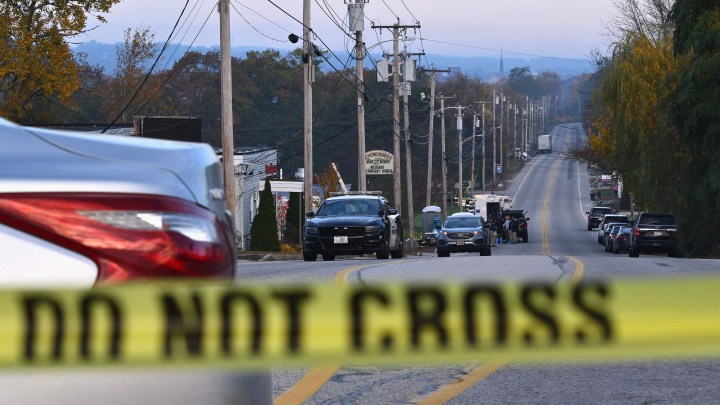
Understanding Maine’s “yellow flag” gun law

It’s been a week since the deadliest mass shooting ever in the state of Maine, when a gunman in the city of Lewiston opened fire at a bowling alley and a bar, killing 18 people and wounding 13 others. In the wake of this tragedy, Maine Gov. Janet Mills, a Democrat, has called for people on both sides of the aisle to gather to address the future of firearms regulation in the state.
For more on what Maine’s gun laws look like, “Marketplace Morning Report” host David Brancaccio spoke with Emily Bader, a reporter for The Maine Monitor, operated by the nonprofit Maine Center for Public Interest Reporting. The following is an edited transcript of their conversation.
David Brancaccio: Back in 2019 — help me understand this — Maine legislators rejected a “red flag” law, as some other states have. What was enacted instead?
Emily Bader: So Maine enacted what’s called a “yellow flag” law, which basically means that only police can take guns or weapons away from a person they deem at risk. Police get a report or something that indicates a person may be at risk to themselves or others, they bring them into protective custody. And then what is different than a lot of other states is they then have to seek, basically, approval from a medical practitioner that says that, yes, they agree this person is a risk. With that medical practitioner’s approval, they then bring it to a court, a judge grants the restriction and then police can take away that person’s weapons.
Brancaccio: And what are you hearing from your reporting? Some critics worry that the yellow flag system slows things down.
Bader: It slows things down. Also, there’s just so many other steps that have to go into it, especially that medical practitioner. Actually, in a report by a panel released earlier this year, the Deadly Force [Review] Panel, they actually conceded that this law is underused because there’s just not a high enough availability of medical practitioners to do these evaluations.
I spoke to Dr. Jeff Barkin. He’s a psychiatrist, immediate past president of Tri-County Mental Health Services, which operates out of Lewiston. And he said that it’s really difficult for a medical practitioner to make those sorts of determinations, especially on the spot, especially knowing whether or not that person is at risk.
Brancaccio: I was looking back at some of the legislation that did not make it into Maine law prior to pandemic. The range of things that didn’t make it includes, I think, there was an idea to force criminal background checks.
Bader: Right. So several bills were put forward that did not pass. That includes background checks. There are also no permits required for sales. Banning bumpstocks, or other devices that make it easier to pull the trigger or fire more bullets — those all failed.
There’s a lot happening in the world. Through it all, Marketplace is here for you.
You rely on Marketplace to break down the world’s events and tell you how it affects you in a fact-based, approachable way. We rely on your financial support to keep making that possible.
Your donation today powers the independent journalism that you rely on. For just $5/month, you can help sustain Marketplace so we can keep reporting on the things that matter to you.











